 Petzlover
Petzlover Drever is originated from Sweden but Wetterhoun is originated from Netherlands. Drever may grow 21 cm / 8 inches shorter than Wetterhoun. Drever may weigh 19 kg / 41 pounds lesser than Wetterhoun. Both Drever and Wetterhoun has almost same life span. Both Drever and Wetterhoun has almost same litter size. Drever requires Low Maintenance. But Wetterhoun requires Moderate Maintenance
Drever is originated from Sweden but Wetterhoun is originated from Netherlands. Drever may grow 21 cm / 8 inches shorter than Wetterhoun. Drever may weigh 19 kg / 41 pounds lesser than Wetterhoun. Both Drever and Wetterhoun has almost same life span. Both Drever and Wetterhoun has almost same litter size. Drever requires Low Maintenance. But Wetterhoun requires Moderate Maintenance
 The Drever dog hails from Sweden, being brought from Germany to the Scandinavian country in 1910. As a scenthound, in spite of his short legs, he was once used for hunting purposes, having a keen nose.
The Drever dog hails from Sweden, being brought from Germany to the Scandinavian country in 1910. As a scenthound, in spite of his short legs, he was once used for hunting purposes, having a keen nose.
The dog was developed from the Westphalian Dachsbracke and then crossbred with other Swedish hounds.
By the 1940s there were two distinctive sizes of this Dachsbracke dog and the larger one was named Drever. It was in 1947 that the Drever was then recognized by the Swedish Kennel Club as a separate breed. It was also recognized by a number of other clubs and registries.
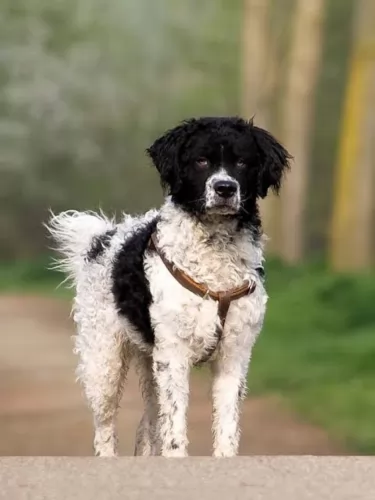 The Wetterhoun is a water dog developed in the 1500 or 1600s to hunt otters. The breed was developed by the Frisians in the Netherlands near the Northwest corner. In addition to catching otters in the lakes near by, they were also used as gundogs to hunt game. They are a fearless, tough and loyal working dog. They love the water and they are build for it with a waterproof coat and tight tail that is spiraled. They will swim happily in freezing cold weather as well.
The Wetterhoun is a water dog developed in the 1500 or 1600s to hunt otters. The breed was developed by the Frisians in the Netherlands near the Northwest corner. In addition to catching otters in the lakes near by, they were also used as gundogs to hunt game. They are a fearless, tough and loyal working dog. They love the water and they are build for it with a waterproof coat and tight tail that is spiraled. They will swim happily in freezing cold weather as well.
The Wetterhoun is rare and not seen outside of the Netherlands. Descendent of the Water Dog, that is now extinct, he is probably a relative of many spaniel types that also call the Water Dog their ancestor. Yet the Wetterhoun is not a spaniel or spaniel type.
The breed almost disappeared during World War II, like many others, they brought back and are now becoming more and more popular. The breed is only recognized by the Federation Cynologique Internationale and the United Kennel Club. AKC does not recognize them, but there are many hunting clubs and other registries that do. They are often promoted as one of the rare breeds.
 Looking quite similar to the Beagle, the Drever is a medium sized dog which stands at about 32 – 38cm and weighing between 14 and 16kg.
Looking quite similar to the Beagle, the Drever is a medium sized dog which stands at about 32 – 38cm and weighing between 14 and 16kg.
He has a fairly long body but unlike the Dachshund his short legs are straight and aren’t bent. The nose of the dog is fairly large and black and the ears are quite long, much like a Beagle dog.
The eyes are bright, alert and dark and the expression on the dog’s face is amicable and gentle.
He has a short, dense coat and is looked upon as a moderate to heavy shedder. The coat can be in several colors such as brown or tan and black with white markings over the face, neck, chest and feet. He has floppy ears and a long tail carried downwards.
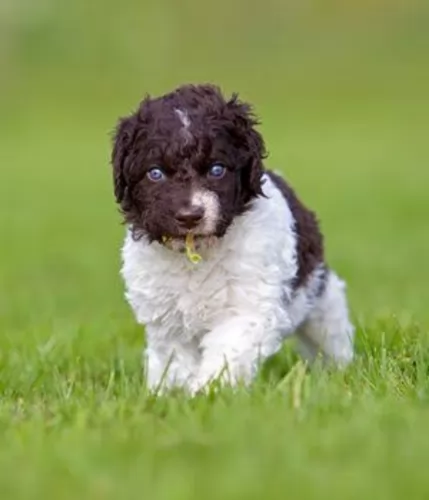 The Wetterhoun is a compact, medium sized breed weighing about 55 to 77 pounds. Great water dogs they are athletically built with low set ears hanging next to their heads, a waterproof coat, distinctive eyes with a very serious expression and a tightly curled tail held aloft over the back. Their coat is waterproof, somewhat oily, curly and thick. The fur is of a smoother texture on the ears, head, and legs. They can be solid black, solid brown, brown with white, or black with white.
The Wetterhoun is a compact, medium sized breed weighing about 55 to 77 pounds. Great water dogs they are athletically built with low set ears hanging next to their heads, a waterproof coat, distinctive eyes with a very serious expression and a tightly curled tail held aloft over the back. Their coat is waterproof, somewhat oily, curly and thick. The fur is of a smoother texture on the ears, head, and legs. They can be solid black, solid brown, brown with white, or black with white.
 The Drever dog is an easy dog to have around, not requiring any special treatment to keep him happy.
The Drever dog is an easy dog to have around, not requiring any special treatment to keep him happy.
He gets on well with every member of the family as well as any pets in the home and fits easily into city- or country life.
He is an active dog however, and will require exercising to avoid him becoming frustrated.
Treat your amicable Drever with the attention he deserves and you’ll have a friendly, calm and devoted pet who wants to be your best friend.
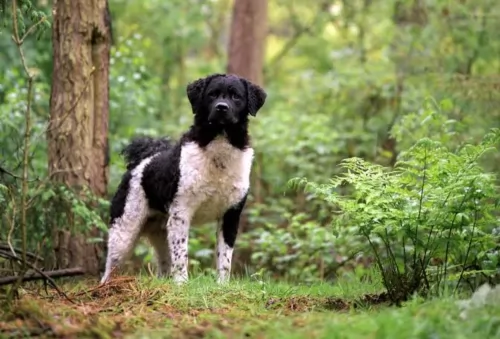 3.Adaptability – not a great apartment dog even though he is not that big. They need space. They need a job and they will finish their job at their own pace no matter what you say. It is impossible to train this trait out of them.
3.Adaptability – not a great apartment dog even though he is not that big. They need space. They need a job and they will finish their job at their own pace no matter what you say. It is impossible to train this trait out of them.
4.Learning ability Very high learning ability, very eager to learn and very smart. He is stubborn about finishing whatever job he is working on
 The Drever is a dog which enjoys good health generally, and with good care he can reach 12 to 15 years of age. The Drever, similar to other dogs, may be susceptible to some common health concerns that any healthy dog can experience such as back pain, hip dysplasia, eye diseases, obesity, diabetes and others.
The Drever is a dog which enjoys good health generally, and with good care he can reach 12 to 15 years of age. The Drever, similar to other dogs, may be susceptible to some common health concerns that any healthy dog can experience such as back pain, hip dysplasia, eye diseases, obesity, diabetes and others.
Veterinary care is an important part of a dog’s health – from puppyhood to the senior years. However, the frequency of visits you make to your vet with your adult dog will depend on his health.
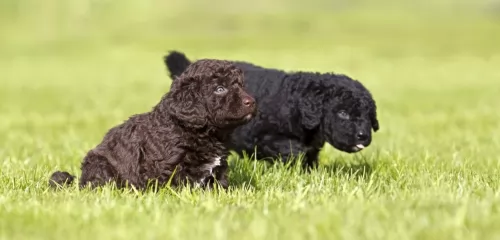 A hardy and healthy breed they do not have severe health issues. But like every his
A hardy and healthy breed they do not have severe health issues. But like every his
• Ear Infections – like any breed with hanging ears they can be prone to infection. This is particularly true because the dogs are in the water a lot. Be sure to clean and dry them after every water episode and inspect them on a regular basis even if the dog has not been in the water.
• Patellar Luxation – Knee cap issue with movement and inflammation. Can cause lameness and arthritis.
 It is important to feed your dog food that will cater to his digestion. That is why some of the best commercially manufactured foods are so good – they cater specifically for a dog’s age, his size, his activity levels and for any illnesses he may have.
It is important to feed your dog food that will cater to his digestion. That is why some of the best commercially manufactured foods are so good – they cater specifically for a dog’s age, his size, his activity levels and for any illnesses he may have.
In terms of activity levels, the Drever is an active dog, quite capable of chasing prey for long distances without tiring. This is why some dog foods are breed- and activity specific.
A good brand of kibble mixed with some cooked brown rice, vegetables and chicken will be excellent for your pet. Remember, if at all possible, to include some raw meat into the diet from time to time. Cool, fresh water should be available at all times.
Maintaining your Drever’s short, coarse coat won’t be a hassle, and you can call him a low maintenance dog. All that is essentially required is for you to give his coat a good brush twice a week. Nails will also need to be checked as well as his ears. Ignoring his ears can lead to wax build up and dirt and this can result in infection.
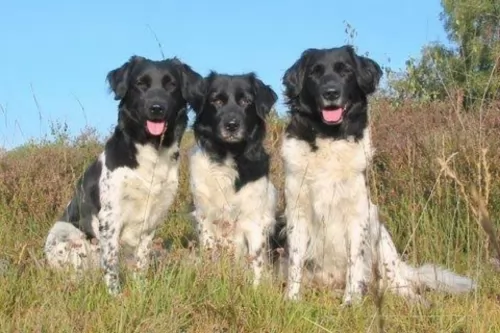 1Feeding the puppy -This is an active, hunting and swimming breed. They need good nutrition and high quality puppy food. A food formulated for active breeds or hunting dogs would be best. Feed your puppy in smaller amounts 3-4 times per day.
1Feeding the puppy -This is an active, hunting and swimming breed. They need good nutrition and high quality puppy food. A food formulated for active breeds or hunting dogs would be best. Feed your puppy in smaller amounts 3-4 times per day.
2.Feeding the adult - This is an active, hunting and swimming breed. They need good nutrition and high quality adult food. A food formulated for active breeds or hunting dogs would be best. Feed your adult twice per day.
4. Games and Exercises – This is an active working dog that needs a lot of exercise every day. A 30 minute walk is only the beginning. They need outdoor time to play and run. They need to swim if at all possible.